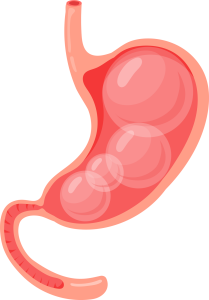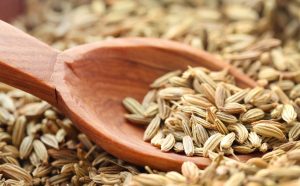Prebiotics are non-digestible fibers that nourish probiotics. These fibers, mainly derived from plant-based sources, resist digestion in the upper gastrointestinal tract and reach the colon intact. Once in the colon, they undergo fermentation, promoting the growth and activity of beneficial bacteria. We will explore different types of prebiotics, their sources, and their role in supporting gut health and overall well-being.
Types of Prebiotics
Prebiotics are non-digestible fibers or compounds that promote the growth and activity of beneficial bacteria in the gut. They serve as food for the beneficial bacteria, helping them thrive and positively affect our health. Here are some common types of prebiotics:
- Inulin: Inulin is a soluble fiber in various plants, such as chicory root, Jerusalem artichokes, and dandelion greens. It serves as a fuel source for beneficial bacteria like Bifidobacteria and Lactobacilli. Inulin is widely used as a prebiotic ingredient in food products and supplements.
- Fructooligosaccharides (FOS): FOS are short-chain carbohydrates that occur naturally in many fruits and vegetables, including bananas, onions, garlic, and asparagus. They are selectively fermented by beneficial bacteria in the gut, promoting their growth and activity.
- Galactooligosaccharides (GOS): GOS is a prebiotic type consisting of short chains of galactose molecules. They are commonly derived from lactose, the sugar found in milk. GOS can stimulate the growth of Bifidobacteria in the gut and is often used in infant formulas and some prebiotic supplements.
- Resistant Starch: Resistant starch is a type of starch that escapes digestion in the small intestine and reaches the colon intact, serving as a prebiotic. Sources of resistant starch include undercooked potatoes, green bananas, legumes, and certain grains like oats and barley. Resistant starch promotes the growth of beneficial bacteria and may have various health benefits.
- Fructans: Fructans are dietary fiber in foods such as wheat, onions, garlic, and certain fruits. They are composed of chains of fructose molecules. Fructans can stimulate the growth of specific beneficial bacteria, but some individuals with irritable bowel syndrome (IBS) may be sensitive to them.
- Mannan-oligosaccharides (MOS): MOS are derived from yeast cell walls and are often used as prebiotic supplements in animal feed. They can enhance the growth of beneficial bacteria and help support healthy gut microbiota.
Different types of prebiotics may have varying effects on the gut microbiota. Some individuals may respond differently to specific prebiotics, and some may experience digestive discomfort when consuming more significant amounts. It’s recommended to introduce prebiotics gradually and monitor your body’s response.
Sources of Prebiotics
Prebiotics are naturally occurring compounds found in various food sources. Here are some familiar sources of prebiotics:
- Chicory Root: Chicory root is one of the richest sources of prebiotic fibers, particularly inulin and oligofructose. It is commonly used as an additive in food products or as a supplement. Chicory root fiber can be added to coffee substitutes, cereals, energy bars, and yogurts.
- Jerusalem Artichoke: Jerusalem artichoke, also known as sunchoke, is a root vegetable with high levels of inulin. It can be cooked and consumed as a side dish or added to soups, stews, or salads.
- Garlic: Garlic is not only known for its distinctive flavor but also for its prebiotic properties. It contains a prebiotic called fructooligosaccharides (FOS). Garlic can be used in various savory dishes, sauces, and marinades.
- Onions: Onions, particularly the bulb and roots, contain a prebiotic fiber called fructans. These fibers provide nourishment for beneficial gut bacteria. Onions are used in various culinary preparations, including soups, stews, stir-fries, and salads.
- Leeks: Leeks are closely related to onions and share similar prebiotic properties. They can be a flavorful addition to dishes like soups, casseroles, or roasted vegetable medleys.
- Asparagus: Asparagus is a nutrient-rich vegetable that also serves as a source of prebiotics. It contains a type of prebiotic fiber called inulin. Asparagus can be grilled, roasted, sautéed, or added to salads.
- Bananas: Ripe bananas are a good source of prebiotics, particularly resistant starch. These starches act as food for beneficial gut bacteria. Enjoy bananas as a standalone snack, or add them to smoothies, oatmeal, or baked goods.
- Whole Grains: Certain whole grains, such as wheat, barley, oats, and rye, contain prebiotic fibers like beta-glucans. These fibers can support the growth of beneficial bacteria in the gut. To reap the prebiotic benefits, include whole-grain bread, cereals, pasta, and rice.
- Legumes: Legumes, including lentils, chickpeas, beans, and peas, are excellent sources of prebiotic fibers. These fibers contribute to gut health and can be incorporated into soups, salads, stews, and side dishes.
- Cocoa and Dark Chocolate: Surprisingly, cocoa and dark chocolate contain prebiotic fibers, such as inulin. Opt for high-quality dark chocolate with a high cocoa content to enjoy the prebiotic benefits.
Benefits of Prebiotics
- Gut Health: Prebiotics are crucial in promoting healthy gut microbiota. They serve as a food source for beneficial bacteria in the gut, such as Bifidobacteria and Lactobacilli, which are known to support gut health. By nourishing these beneficial bacteria, prebiotics helps maintain a balanced gut microbiome, essential for optimal digestion, nutrient absorption, and overall digestive health.
- Improved Digestion: Prebiotics can enhance digestion by promoting the growth of beneficial bacteria that help break down food and produce critical digestive enzymes. This can improve nutrient absorption, reduce bloating, and more regular bowel movements. Prebiotics, especially soluble fibers like inulin, can also increase stool bulk and soften it, which may help alleviate constipation.
- Enhanced Immune Function: The gut plays a vital role in immune function, and prebiotics can support a healthy immune system. By nourishing beneficial bacteria in the gut, prebiotics help modulate the immune response and strengthen the gut barrier function. This can enhance the body’s defense against harmful pathogens and reduce the risk of certain infections.
- Weight Management: Prebiotics may affect weight management and metabolic health. They can increase feelings of fullness and satiety, which may help regulate appetite and prevent overeating. Additionally, some research suggests that certain prebiotics can influence energy metabolism and promote the breakdown of fats, potentially contributing to healthy weight management.
- Blood Sugar Regulation: Prebiotics, particularly soluble fibers, can help regulate blood sugar levels by slowing down the digestion and absorption of carbohydrates. This can lead to a more gradual and controlled release of glucose into the bloodstream, helping to stabilize blood sugar levels. Maintaining stable blood sugar levels is important for overall health and can be especially beneficial for individuals with diabetes or those at risk of developing diabetes.
- Reduced Inflammation: A healthy gut microbiota and a balanced immune response are crucial for maintaining low levels of inflammation in the body. Prebiotics can help promote a healthy gut environment and modulate the immune system, potentially reducing chronic inflammation. By lowering inflammation levels, prebiotics may positively impact various inflammation-related health conditions, such as inflammatory bowel diseases, allergies, and certain metabolic disorders.
- Mental Well-being: Emerging research suggests a connection between gut microbiota and mental health. Prebiotics may indirectly support mental well-being by promoting a healthy gut microbiome. Beneficial gut bacteria can produce neurotransmitters and other compounds influencing brain function and mood. By fostering a diverse and balanced gut microbiota, prebiotics may contribute to a healthy gut-brain axis and support mental health.
Cons of Prebiotics
While prebiotics offer numerous health benefits, it’s essential to consider potential drawbacks or negatives associated with their consumption. Here are a few factors to be mindful of:
- Digestive Discomfort: Some individuals may experience digestive discomforts, such as bloating, gas, or abdominal cramps when consuming prebiotics. This is because prebiotics are fermented by beneficial gut bacteria, which can produce gas as a byproduct. Such discomfort is temporary and tends to subside as the gut microbiota adapts and balances itself. However, individuals with sensitive digestive systems or certain gastrointestinal conditions, such as irritable bowel syndrome (IBS), may be more prone to experiencing these symptoms.
- Allergies or Sensitivities: Prebiotics are typically derived from natural sources, such as plant fibers. While rare, some individuals may have allergies or sensitivities to specific prebiotic sources. For example, individuals with fructose malabsorption may experience digestive issues when consuming fructooligosaccharides (FOS), a prebiotic. Knowing any known food allergies or sensitivities is essential, and choosing prebiotic sources accordingly.
- Excessive Intake: Consuming very high doses of prebiotics, especially supplements, can lead to an imbalance in gut bacteria. This can result in excessive fermentation, causing gastrointestinal symptoms like bloating, gas, and diarrhea. It’s recommended to start with small amounts of prebiotics and gradually increase intake to allow the gut microbiota to adjust.
- Individual Variations: The effects of prebiotics can vary from person to person. Each individual has a unique gut microbiota composition, and certain prebiotics may interact differently with specific bacterial strains. Therefore, the response to prebiotics can vary, and what works well for one person may not have the same effect on another.
- Interactions with Medications: Some prebiotic supplements or high-dose prebiotics may interact with certain medications. For instance, prebiotics with laxative effects, such as high doses of specific fibers, may interfere with the absorption or efficacy of certain medications. It’s advisable to consult with a healthcare professional or pharmacist if you are taking medications and considering high-dose prebiotic supplementation.
- Specific Health Conditions: Prebiotics generally provide health benefits, but individuals with specific conditions may need caution. For example, individuals with small intestinal bacterial overgrowth (SIBO) or certain digestive disorders, like Crohn’s disease, may need to limit or avoid specific prebiotics, as they can sometimes exacerbate symptoms. Consulting with a healthcare professional or registered dietitian can help determine the suitability of prebiotics for individual health conditions.
- Limited Availability in Food Sources: While some prebiotics occur naturally in foods like onions, garlic, bananas, and asparagus, they may need to be sufficiently present to provide significant benefits. As a result, supplementation with prebiotic products may be necessary to achieve desired effects.
- Allergy or Sensitivity Risks: Some individuals may have allergies or sensitivities to specific types of prebiotics, such as inulin or FOS (fructooligosaccharides). It is essential to be aware of any personal allergies or sensitivities and choose prebiotics accordingly.
Choosing the Right Prebiotic Supplement
Choosing the right prebiotic supplement can be a beneficial addition to your overall health and well-being. Here are some factors to consider when selecting a prebiotic supplement:
- Type of Prebiotic: Look for a supplement that contains specific prebiotic fibers known to benefit the gut microbiome, such as inulin, oligofructose, or fructooligosaccharides (FOS). These fibers have been extensively studied for their prebiotic properties.
- Quality and Purity: Ensure the supplement is high quality and has undergone rigorous testing for purity, potency, and safety. Look for reputable brands that follow good manufacturing practices (GMP) and have third-party certifications to ensure product quality.
- Dosage and Concentration: Consider the dosage and concentration of prebiotics in the supplement. The recommended dosage may vary depending on the specific prebiotic used. Following the manufacturer’s recommended dosage instructions is essential or consult a healthcare professional for personalized guidance.
- Other Ingredients: Check the supplement label for additional ingredients, fillers, or additives. Choosing supplements with minimal artificial additives, preservatives, or allergens is best to ensure a clean and pure product.
- Form and Delivery Method: Prebiotic supplements are available in various forms, including capsules, powders, and chewable tablets. Consider your personal preference and ease of use when selecting the form that suits you best. Powders can be easily mixed into beverages or food, while capsules offer convenience for on-the-go usage.
- Allergens and Sensitivities: If you have any known allergies or sensitivities, carefully review the supplement label for potential allergens, such as gluten, dairy, or soy. Opt for supplements free from common allergens to avoid adverse reactions.
- Shelf Stability: Pay attention to the shelf stability of the supplement. Some prebiotics are sensitive to heat, moisture, or light, affecting their efficacy. Look for supplements that are stored and packaged in a way that preserves the stability and potency of the prebiotics.
- Scientific Support: Consider whether the supplement has scientific evidence supporting its effectiveness. Look for studies or clinical trials demonstrating the benefits of the specific prebiotic formulation or brand you are considering.
- Personal Health Needs: Consider your specific health needs and goals. Consult with a healthcare professional or registered dietitian to determine if a prebiotic supplement is appropriate, especially if you have any underlying health conditions or are taking medications.





